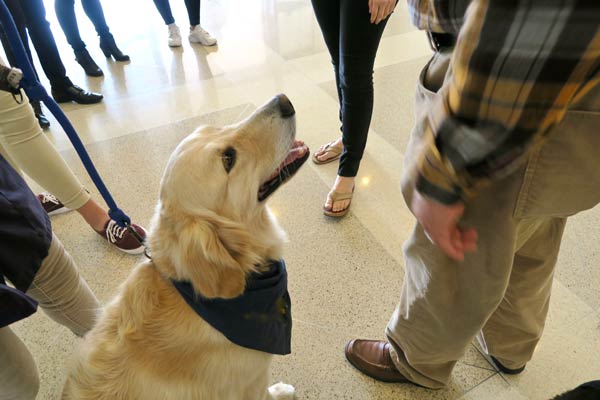According to Food Allergy Research & Education, an organization that works on behalf of Americans with food allergies, one in every 13 children in the United States has a food allergy, and peanuts are one of the 8 most common food allergens. Reactions can be mild, but for some people, life-threatening anaphylaxis is a risk. There is no cure for a peanut allergy, so the only treatment is to avoid peanuts and peanut products altogether.
Imagine having a deadly allergy to something that could turn up anywhere. For people with this allergy, keeping peanuts out of their homes isn’t enough — they must be cautious when they’re out in the world, as well. Restaurants, schools, even playgrounds can all be contaminated with peanut products. For example, it only takes somebody with peanut butter on his hands to touch something to make it potentially lethal to a person with a peanut allergy.
However, it can be impossible for people to detect minute traces of peanuts. Dogs on the other hand, with their superior sense of smell, can successfully tackle the task. Just as a dog can be trained for explosive or bedbug detection, he also can be trained to sniff for the presence of peanuts and peanut products. For some people with a severe peanut allergy, these peanut detection dogs are proving to be invaluable.
A peanut detection dog scans the environment for traces of peanuts, keeping the allergic person safe from contact with the allergen. Whenever the dog detects the scent of peanuts, he will give a trained response such as a sit, known as an “alert,” to indicate what he has found. His duties can include sniffing foods before they are eaten, smelling any item entering the home such as library books or toys, and even scanning guests before they enter the house to ensure they are free of any trace of peanuts. The dog can also accompany his human partner to public places and perform those same safety checks out in the world.

Although a peanut detection dog has a job to do, he also must fit in with the family as a well-behaved pet. Basic obedience is just as essential as scent detection skills, and personality is key. The dog needs to know when to work and when to lie quietly waiting for the next task, as well as be a good match for the allergic person’s lifestyle. Many breeds of dog are used as peanut detection dogs, including breeds that are considered hypoallergenic, such as the Poodle, and are therefore more suitable for people with a dog allergy, as well.
Various organizations around the country train peanut detection dogs; however, these dogs can be very expensive, as much as $10,000 or more. The high cost is due to the extensive time and expertise needed to train them. But if you or your loved one has a severe allergy to peanuts, they can be a literal lifesaver. Because there is no cure for a peanut allergy, taking every precaution can include using the incredible power of a dog’s nose.

